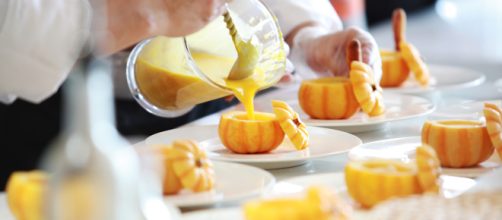As restaurant servers and bartenders across America fight for a full minimum wage during Food Safety Month (September), many people may be wondering if such a position deserves what they are fighting for. Quality service is traditionally exchanged for a monetary tip (though compliments are lovely, they don’t pay the bills), and while there are no legal obligations to tip, with the exception of event contracts, it is customary to do so to a server/bartender for the service you received from them. A typical tip ranges from 15-25%, though there are always exceptions on both ends of that spectrum.
And yes, it may not be rocket science to serve tables, but safety is a key component most customers don't think about. And it just so happens restaurant servers know a few survival skills picked up on the job that are not only important to know when touching something another will consume but can help keep others safe. Here are four survival skills learned from serving tables.
1. A knee-jerk alert system is developed
There is a term the majority of, if not all, restaurant staff use - whether you’re in FOH (front of the house) or BOH (back of the house) - and that term is: “Behind You!” It’s used to keep spills and trips and all other kinds of bumping situations from happening in a restaurant where an abundance of people are all moving around a small space, with hot plates and breakable dinnerware everywhere.
The simple phrase above lets someone know a person is right behind him or her and based on the situation, allows them to act accordingly.
2. Knowledge of food safety
In most states, it’s called a Food Handlers card and it’s something servers are generally asked to get by their employers before being allowed to handle food. After training and testing on state-issued guidelines for food safety, the restaurant employee is then issued a card armed with knowledge on the proper way to act around food for public consumption. And though it may sound silly, it's definitely not, as anyone who’s had food-poisoning will attest too. Things like cross-contamination, food temperatures, and hand washing are essential to keeping people safe and servers have more knowledge in this area than most, out of sheer necessity for what they do.
3. Knife holder expert
Pretty much every server has, at one time or another, cut him/herself with a knife, whether from slicing fruit to simply picking up a dirty blade the wrong way and that will likely make a person learn quickly that knives are no joke and need to be treated as such. Keeping a knife blade down when walking is imperative at all times and can be considered rule number one in a restaurant, immediately followed by rule number two – place knives handle-up in all dish racks (clean or dirty.)
4. Allergy virtuoso
Grown out of customer demand, servers have, by default, become incredibly knowledgeable on allergies, from gluten to peanuts, soy to legumes. For some customers, it’s a food preference or sensitivity and not actually an allergy, while to others, it's a life-threatening ailment of high importance, News Press Now notes.
Servers worth their salt deal with both, all-the-while making sure customers don’t consume anything they don't want to or shouldn’t, and yes, sometimes it is in fact, a life or death situation. Anyone who’s seen someone need an Epi-pen in the middle of the meal will forever know the importance of accurate ingredient information.
Alcohol legalities for servers
Working at restaurants in which you serve alcohol bring along certain restrictions and obligations servers have to heed and pay attention to, as well. This is especially important as one can be held accountable for a guest's actions outside of the restaurant, which bring along very real consequences to all involved. Cutting someone off is not only a legal obligation for a server but also a safeguard to help stop the endangerment of others.


